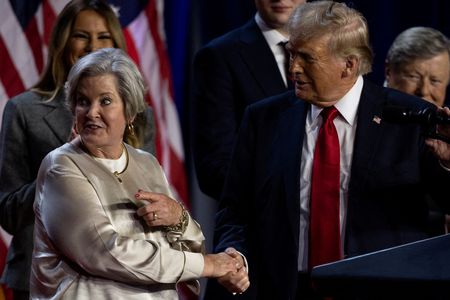This article is from: srnnews.com
By Gram Slattery and Alexandra Ulmer
WEST PALM BEACH, Florida (Reuters) – As advisers and allies of Republican President-elect Donald Trump search for personnel to staff his coming administration, one quality is absolutely paramount: unquestioning loyalty.
During his 2017-2021 term, Trump butted heads with key appointees, particularly those in the intelligence, national security and law enforcement communities, several of whom later recounted slow-walking or trying to talk Trump out of his most controversial plans.
Without people around him who are inclined to push back, the president-elect may find it easier to bend longstanding norms in pursuit of his conservative agenda, both Trump supporters and opponents say.
On Thursday, Trump named his campaign chief, Susie Wiles, as White House chief of staff. And on Saturday, Trump said he would not invite back his former U.N. ambassador, Nikki Haley, nor his former secretary of state, Mike Pompeo, both of whom have criticized elements of Trump’s conduct and policy, even as they tried to make amends in recent months.
Just days before the Nov. 5 election, one of Trump’s former chiefs of staff, John Kelly, called him a “fascist” in an interview. One of his national security advisers, John Bolton, has repeatedly described Trump as unintelligent. And his second defense secretary, Mark Esper, recounted talking Trump out of bombing drug cartels in Mexico in his 2022 autobiography.
Trump has in return blasted those former cabinet-level officials, going so far as to suggest that his second joint chiefs of staff chairman, Mark Milley, should have been executed for treason. This time around, Trump has said only true believers in him – and in his “Make America Great Again” movement – will be allowed into government.
“President Trump has publicly said that he’s learned from his first term,” Mike Davis, a conservative attorney who frequently talks to the president-elect, told Reuters. Davis, who helped Trump get his Supreme Court picks through the Senate as a high-ranking Capitol Hill aide, has drawn frequent praise from Trump’s most conservative allies.
“Political appointees require both competency and loyalty. You can’t have just one or the other. You need both.”
On X last week, Davis put it bluntly: “Before asking me for help, I am going to ask you to provide me specific and concrete evidence of your loyalty to Trump,” he wrote. “If you cannot provide a lot of that, stop asking me.”
A FORENSIC LOOK
To keep actors considered disloyal out of Trump’s government, his transition team is taking a forensic look at every potential appointee for signs they might turn against their boss, even for lower-level appointees like assistant and deputy secretaries, according to two people involved in the effort.
Researchers contracted by Trump’s transition team are sifting through potential appointees’ past statements to see if they have ever spoken negatively about Trump, according to one of those people involved in the transition effort, who has direct knowledge of the matter. They are also checking if potential appointees have donated to Democrats – or even to Republicans who have sharply criticized the president-elect, that person said.
While such donations or negative statements are not necessarily disqualifiers, the person added, they are demerits.
Davis singled out the attorney general as a particularly crucial position.
Trump fired his first attorney general, Jeff Sessions, after he declined to shut down inquiries into contacts between Trump’s 2016 campaign and Russian officials. Trump later said that hiring Sessions was his “biggest mistake.”
Trump also fired his first FBI director, James Comey, under similar circumstances.
With a more loyal attorney general and FBI director, Trump allies say, he would be less likely to face damaging probes. Trump would also likely face less resistance if he tries to make good on campaign trail pledges to investigate opponents, including Democratic President Joe Biden, a matter of serious concern for Democrats and civil servants.
A spokesperson for Trump did not address the dynamics of how potential political appointees were being selected, beyond saying decisions on key appointments were imminent. Three appointments – White House chief of staff, U.S. ambassador to the United Nations and border czar – have already been announced.
In a statement, the Democratic National Committee expressed concern that Trump was choosing loyalists they said would put Trump’s interests over those of the nation.
“Instead of making sure agencies and law enforcement have the best and the brightest with the resources they need, Trump and his cronies are looking to dole out job offers to loyalists who will put Trump ahead of the American people,” said Alex Floyd, a DNC spokesperson.
LOYALTY TO POLICY – AND THE MAN
While it is normal for presidents to choose loyal allies for key appointments, the focus on loyalty over subject-matter expertise goes beyond the norm, according to interviews with five Trump advisers and public statements made by the president-elect’s associates.
In many cabinets, presidents often reach out to the various wings of their own party so that distinct ideological factions have a seat at the table. Vice President Kamala Harris, the Democratic nominee, said on the trail that she would appoint a Republican to her cabinet.
“We’re going to give people the role based on their capacity — and their fidelity and loyalty to the policy, as well as to the man,” Howard Lutnick, the co-chair of Trump’s transition effort, told the Financial Times last month.
One Trump adviser predicted the president-elect would bring much of his campaign to the White House, many members of whom have proven their loyalty in Trump’s eyes by running a disciplined and tight-lipped campaign. Last time around, that adviser noted, Trump hired officials from the Republican National Committee.
“Loyalty is super important,” said the Trump adviser, who was not authorized to speak to the media.
“There will be a lot more of the campaign staff that will transition over to the White House. Last time, a lot of party folks ended up in the White House, but their loyalty wasn’t to the president. It was to themselves.”
(Reporting by Gram Slattery in West Palm Beach, Florida, and Alexandra Ulmer in San Francisco; Additional reporting by Aram Roston in Washington; Editing by Ross Colvin and Howard Goller)
Brought to you by www.srnnews.com





















